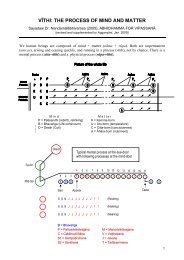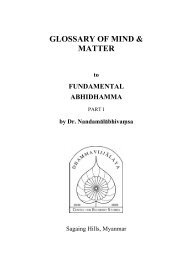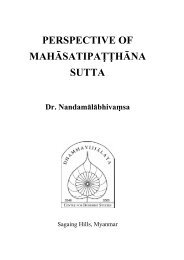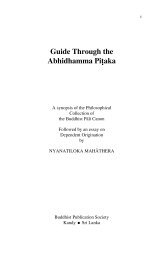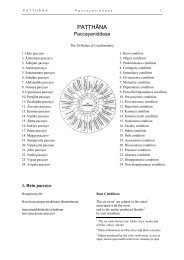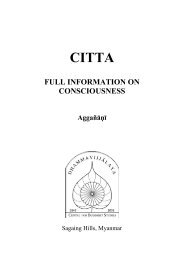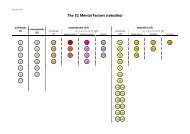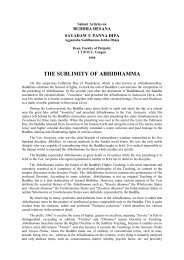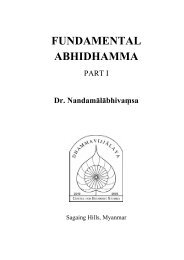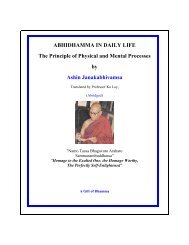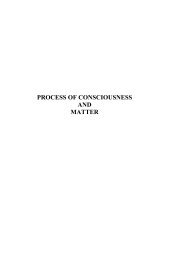Mahathera Ledi Sayadaw - Abhidhamma.com
Mahathera Ledi Sayadaw - Abhidhamma.com
Mahathera Ledi Sayadaw - Abhidhamma.com
You also want an ePaper? Increase the reach of your titles
YUMPU automatically turns print PDFs into web optimized ePapers that Google loves.
onditioned mind during the lifetime. Here by "the moment of conception" is meant the nascent<br />
instant of the rebirth-conception, and by "the lifetime" is meant the period starting from the static<br />
instant of the rebirth-conception right on to the moment of the dying-thought.<br />
In what sense is hetu to be understood And in what sense paccaya Hetu is to be understood in<br />
the sense of root (mulattha); and paccaya in the sense of assisting in the arising, or the <strong>com</strong>ing to<br />
be, of the paccayuppanna dhamma or upakarattha. Of these two, mulattha is the state of being a<br />
root of the root, greed--and so on, as shown in Mula- yamaka. We have illustrated this mulattha in<br />
the Mula-yamaka-dipani by the simile of a tree. However, we shall deal with it here again.<br />
Suppose a man is in love with a woman. Now so long as he does not dispel the lustful thought, all<br />
his acts, words and thoughts regarding this woman, will be cooperating with lust (or greed), which<br />
at the same time has also under its control the material qualities produced by the same thought.<br />
We see then that all these states of mental and material qualities have their root in lustful greed for<br />
that woman. Hence, by being a hetu (for it acts as a root) and by being a paccaya (for it assists in<br />
the arising of those states of mind and body), greed is hetu- paccaya. The rest may be explained<br />
and understood in the same manner- i.e., the arising of greed by way of desire for desirable things;<br />
the arising of hate by way of antipathy against hateful things; and the arising of dullness by way<br />
of lack of knowledge respecting dull things.<br />
Take a tree as an illustration--we see that the roots of a tree, having firmly established themselves<br />
in the ground and drawing up sap both from soil and water, carry that sap right up to the crown of<br />
the tree, and so the tree develops and grows for a long time. In the same way, greed, having firmly<br />
established itself in desirable things and drawing up the essence of pleasure and enjoyment from<br />
them, conveys that essence to the con<strong>com</strong>itant mental elements, till they burst into immoral acts<br />
and words. That is to say, greed brings about transgression as regards moral acts and words. The<br />
same is to be said of hate, which by way of aversion draws up the essence of displeasure and<br />
dis<strong>com</strong>fort, and also of dullness, which by way of lack of knowledge cherishes the growth of the<br />
essence of vain thought on many an object.<br />
Transporting the essence thus, the three elements, lobha, dosa, and moha, operate upon the<br />
<strong>com</strong>ponent parts, so that they be<strong>com</strong>e happy (so to speak) and joyful at the desirable objects, etc.<br />
The <strong>com</strong>ponent parts also be<strong>com</strong>e as they are operated upon, while the coexistent material<br />
qualities share the same effect. Here, from the words Sampayutta-dhamme abhiharati, it is to be<br />
understood that lobha transports the essence of pleasure and enjoyment to the con<strong>com</strong>itant<br />
elements.<br />
Coming now to the bright side--suppose the man sees danger in sensual pleasure, and gives up<br />
that lustful thought for the woman. In doing so, disinterestedness as regards her arises in him.<br />
Before this, there took place impure acts, words and thoughts having illusion as their root; but for<br />
the time being these are no longer present and in their stead there arise pure acts, words and<br />
thoughts having their root in disinterestedness. Moreover, renunciation, self-control, Jhanaexercise<br />
or higher ecstatic thoughts also <strong>com</strong>e into being. Disinterestedness (alobha), therefore, is<br />
known as hetu-paccaya, it being a hetu because it acts as a root, while it is a paccaya because it<br />
assists in the arising of the con<strong>com</strong>itant. The same explanation applies to the remainder of<br />
disinterestedness and aIso to amity and intelligence, which three are the opposites of greed, hate<br />
and ignorance respectively.<br />
Here, just as the root of the tree stimulates the whole stem and its parts, so it is with<br />
disinterestedness. It dispels the desire for desirable things and having promoted the growth of the<br />
essence of pleasure void of greed it cherishes the con<strong>com</strong>itant elements with that essence till they<br />
be<strong>com</strong>e so happy and joyful that they even reach the height of Jhanic-, Path-, or Fruition-pleasure.<br />
Similarly, amity and intelligence respectively dispel hate and ignorance with regard to hateful and<br />
dull things and promote the growth of the essence of pleasure void of hate and dullness. Thus the<br />
operation of the three elements (alobha, adosa, and amoha) lasts for a long time, making their




